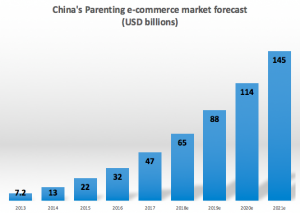Beijing-based online parenting platform BabyTree is reportedly to begin its listing hearing with the Hong Kong Stock Exchange (HKEx) this Thursday. After 7 previous fundraising rounds, the 11-year old firm is now looking to raise up to US$800 million in its upcoming public float.
While BabyTree’s journey to the public market seems longer than its peers – other Chinese tech giants like Pinduoduo, Xiaomi etc took 3 and 8 years respectively – the firm did manage to take all those years to build up a solid business.
As of now, BabyTree has more than 139 million monthly active users, almost twice its closest competitor. It also has the most comprehensive online professionally generated content (PGC) on parenting, consisting of contents ranging from articles, musical numbers, videos, etc.
Founded in 2007 by ex-Googler Wang Huainan and Wang Huainan, BabyTree, over the past ten years, adopted quite a series of novel business ideas – from online parenting, social e-commerce, to today’s C2M (customer to manufacturer) and new retail concept – at different times, with its development per se epitomizing the development of Chinese internet industry, and always revolving around the core parenting conception.
BabyTree’s latest round was made by Chinese e-commerce giant Alibaba. In addition to capital injection, the two would also collaborate in areas like C2M and new retail. The tie-up with Alibaba, according to Wang, was intended to unleash his company’s monetization potential.
The firm has seen strong revenue growth over the past few years as losses narrowed. Specifically, in 2017, the firm enjoyed a 43% year-on-year revenue growth and saw its losses fell from RMB 935 million (US$135 million) to RMB 911 million (US$131 million) in the same year. Its revenue drivers come from mostly brand advertising and e-commerce.
This performance coincides with the boom in China’s domestic maternal and child e-commerce marker over the period from 2014-2017. According to iResearch data, that market grew by 59.5% and is forecasted to continue this upward trend up to RMB 1.2 trillion (US$ 173 billion) by 2022.

Nevertheless, this decision to transit into a public entity could be risky given the uncertainty in the market, and the recent shake-up in the global markets.
Editor: Ben Jiang
